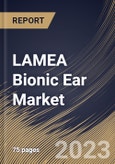The quality of life for those who are hard of hearing has been greatly enhanced by bionic ear technology. The size, discretion, and strength of bionic ears have recently changed. Directional microphones, artificial intelligence, hybrid technology, and internet connectivity might all be used to integrate them, improving user experience and sound quality. The development of the market is being fueled by these developments and an increase in consumer knowledge of various audiology technologies.
The aging population, rising rates of hearing loss, technological improvements, and attractive reimbursement policies have all contributed to the market's tremendous growth. In addition, the technology behind bionic ears has also advanced significantly during the past few years. As an illustration, cochlear implants are now equipped with wireless connectivity, enabling them to connect with external devices like cell phones, televisions, or any other audio gear.
The prevalence of congenital hearing loss is 1-2 per 1,000 newborns worldwide, but it can reach 6 per 1,000 in regions like Sub-Saharan Africa. Therefore, it is recommended that young children with hearing impairments receive early diagnosis and treatment to maximize their social-emotional, speech, cognitive, and language development. Additionally, Brazil, the GCC nations, and Africa, are increasing their healthcare expenditure along with strengthening the medical infrastructure. Thus, it is anticipated that the increasing prevalence of hearing loss and greater awareness will help the market's growth.
The Brazil market dominated the LAMEA Bionic Ear Market by Country in 2022 and would continue to be a dominant market till 2029; thereby, achieving a market value of $62.5 Million by 2029. The Argentina market is anticipated to grow at a CAGR of 11.5% during (2023-2029). Additionally, The UAE market would display a CAGR of 10.6% during (2023-2029).
Based on End-use, the market is segmented into Hospitals, Clinics, and Others. Based on Type, the market is segmented into Cochlear Implant, Auditory Brainstem Implants, and BAHA/BAHS. Based on countries, the market is segmented into Brazil, Argentina, UAE, Saudi Arabia, South Africa, Nigeria, and Rest of LAMEA.
The market research report covers the analysis of key stake holders of the market. Key companies profiled in the report include Cochlear Ltd., MED-EL GmbH, Sonova Holding AG, Zhejiang Uniview Technologies Co., Ltd. (Hangzhou Jiaozhi Technology Co., Ltd.), Boston Scientific Corporation, Medtronic PLC, Amplifon S.P.A., Starkey laboratories, Inc., GN Store Nord A/S (GN Hearing A/S), and WS Audiology A/S.
Scope of the Study
By End-use
- Hospitals
- Clinics
- Others
By Type
- Cochlear Implant
- Auditory Brainstem Implants
- BAHA/BAHS
By Country
- Brazil
- Argentina
- UAE
- Saudi Arabia
- South Africa
- Nigeria
- Rest of LAMEA
Key Market Players
List of Companies Profiled in the Report:
- Cochlear Ltd.
- MED-EL GmbH
- Sonova Holding AG
- Zhejiang Uniview Technologies Co., Ltd. (Hangzhou Jiaozhi Technology Co., Ltd.)
- Boston Scientific Corporation
- Medtronic PLC
- Amplifon S.P.A.
- Starkey laboratories, Inc.
- GN Store Nord A/S (GN Hearing A/S)
- WS Audiology A/S
Unique Offerings
- Exhaustive coverage
- The highest number of Market tables and figures
- Subscription-based model available
- Guaranteed best price
- Assured post sales research support with 10% customization free
Table of Contents
Companies Mentioned
- Cochlear Ltd.
- MED-EL GmbH
- Sonova Holding AG
- Zhejiang Uniview Technologies Co., Ltd. (Hangzhou Jiaozhi Technology Co., Ltd.)
- Boston Scientific Corporation
- Medtronic PLC
- Amplifon S.P.A.
- Starkey laboratories, Inc.
- GN Store Nord A/S (GN Hearing A/S)
- WS Audiology A/S








